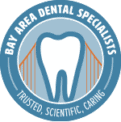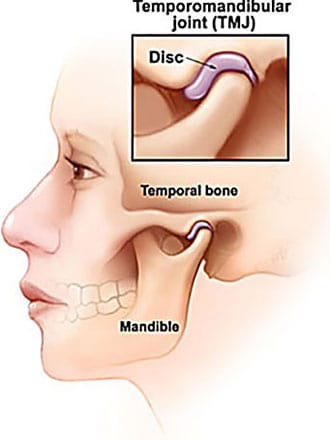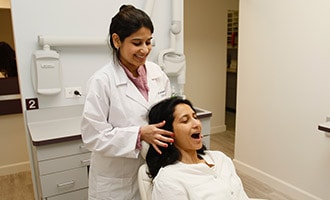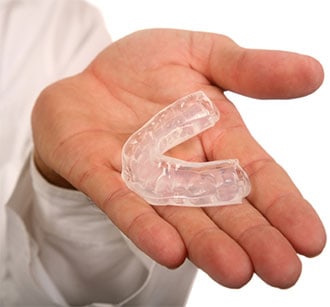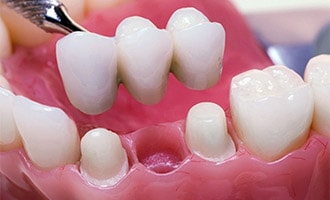
TMJ is an abbreviation for “temporomandibular joint”, which is the technical name for the jaw joint. It is called “temporomandibular” because it connects the lower jaw (mandible) to the “temporal” (underneath the temples) skull bone directly in front of your ears. The jaw joints and the attached muscles are what you use when you talk, chew or yawn.
TMJ Disorders (TMD) are problems with these jaw joints or the muscles that control them. Various forces can cause undue stress on these structures which results in face pain, neck pain, headaches and other difficulties.
Dental Specialist in Bite Alignment and TMJ Function
As a prosthodontist, Dr. Bhave is a dental specialist in the aesthetic and functional restoration of teeth. Establishing proper bite alignment and jaw motion are key elements in creating a fully functional and comfortable smile.
Part of her advanced training includes a full understanding of how the jaw joints work and the ability to effectively treat TMJ disorders. Dr. Bhave is highly skilled at providing relief from TMJ discomfort and can treatment plan even complex cases for resolution of TMJ problems.
Symptoms That Indicate a Malfunctioning TMJ
Typical symptoms of TMJ disorder (TMD) include:
- Neck pain
- Upper shoulder pain
- Difficulty opening the mouth very wide
- Clicking, popping or grating sounds when opening and closing the mouth
- Facial pain or tenderness around the jaw joint area
- Headaches
- Ringing in the ears
- Toothaches
- Earaches
- Difficulty chewing
- Jaws that get “locked”

If you are experiencing any of the above symptoms, take advantage of our special offer to see Dr. Bhave for a comprehensive exam, digital X-rays, consultation and treatment plan. Your visit will include:
Contact us to request an appointment
Discovering Causes of TMJ Problems
TMJ problems can be caused by a number of different factors, each of which throw the jaw joints out of alignment and create excessive strain in the surrounding muscles and nerves. Chief sources of these problems are bite misalignment, teeth grinding, teeth clenching and muscle tightening resulting from emotional stress. Problems can also result from the joints becoming dislocated, receiving an injury or developing arthritis.
Dr. Bhave conducts a thorough clinical exam to discover what is causing your symptoms. This includes a comprehensive check of your bite alignment and a full inspection of the muscle tension in your face, neck and shoulders.
3D CT Scan of Teeth & Jaw
She also takes a 3D CT scan of your teeth, jaw and surrounding anatomy. The scanned images provide crisp 3D 360-degree views of the jaw joint and surrounding structures, providing detailed information not available from any other method. From the data gathered, Dr. Bhave develops a customized treatment plan to address the situation.
Treatment for TMJ Disorders
The following are the main treatments Dr. Bhave uses to relieve or resolve TMJ problems:
Oral appliance therapy
Dr. Bhave can custom-fabricate an oral appliance, similar to a night guard, that maintains your jaws comfortably in an optimum position while you sleep. This relieves a great deal of jaw and/or muscle strain.
Oral appliances can also be made to prevent the tendency to grind or clench your teeth. Oral appliance therapy is an effective treatment for alleviating TMJ problems for the vast majority of cases.
Orthodontic Correction
Sometimes misaligned and crooked teeth create an improper bite relationship which puts undue strain on the jaw joints or connected muscles. Dr. Bhave can straighten teeth with Invisalign® clear aligners. With Invisalign, teeth are straightened without the discomfort and inconvenience that comes with wearing traditional braces.
Learn more about Invisalign.
New Dental Restorations
Dental restorations such as crowns, dental bridges and implant-supported new teeth can sometimes help create optimum bite alignment and reduce or eliminate the stress on your jaw joints. Dr. Bhave is a specialist in designing and placing restorations that are well-fitting and align with the rest of your bite. She will let you know if new dental restorations would be appropriate for your situation.
